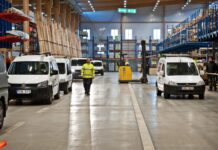The retail trend that’s here to stay?
In recent years, our industry has undergone a significant transformation. Driven by both increased consumer awareness of the need for sustainable products and practices and larger established businesses and PLC’s leading the way.
Among the most exciting and impactful trends in the broader retail sector in the UK is the growth in demand for preloved, reclaimed, and recycled products. These terms, once associated with second-hand shopping or small niche markets, are becoming mainstream as more and more consumers and retailers embrace the principles of the circular economy.
Although the recycling and reclaiming of products for the home has been around since Medieval times, the retail industry was formed and grew rapidly on creating a compelling desire within consumers for new products. We’re all influenced by shiny, new things – the very latest phone, new clothing or the on-trend look within our own homes and gardens.
This has been the case for decades and was single-handedly responsible for fuelling the growth of retail as we know, from the development of high streets to chain stores, out of town big boxes and the online retail revolution, including Amazon.
For many consumers, despite the fact the majority of us live in ‘pre-loved’ houses and drive ‘second hand’ cars, the thought of buying second-hand products from a normal retail store is simply not on our radar. We just don’t expect to see second hand products whilst walking round a DIY store or garden centre and would probably refuse to buy them anyway – but why is that?
Fortunately, the younger generations, Millennials and particularly Gen Zs, don’t seem to have the same issues. Whether that’s because they have been forced to consider buying pre-loved or second-hand products to get what they want, due to increasing cost of housing or simply high living costs, is hard to say, but it probably makes sense.
If you think about it, for DIY consumers, it really doesn’t make a lot of sense to buy a brand-new power tool, that’s travelled half-way around the world, use it for 30 minutes and then store it in a cupboard or garage for 12 months until it’s used again. It would make far more sense to buy an approved, used product at only a proportion of the original cost or even rent one, if only that option was available.
Many well-known brands from eBay to Depop and from Etsy to Vinted have achieved stellar growth by selling pre-loved fashion, but it’s a complete mystery to me as to why it’s taken so long for this trend to become accepted and established within the Home Improvement sector.
Why does it make sense?
But why does it make sense for consumers to buy Pre-loved, Reclaimed or Recycled products?
- Environmental Benefits: Buying preloved items means consumers are reducing waste and minimising the need for new products to be manufactured, helping to lower carbon footprints and conserve natural resources.
- Cost Savings: Buying preloved can often be a more affordable option, which appeals to budget-conscious consumers.
- Waste Reduction: Reclaiming materials from old structures, furniture, or textiles diverts waste from landfills and reduces the demand for new raw materials.
- Heritage and Craftsmanship: Reclaimed goods often carry a sense of history and craftsmanship. Reclaimed wood furniture for example may have unique textures or patinas that mass-produced items simply cannot replicate.
- Innovation and Technology: Advances in recycling technology mean that materials once considered non-recyclable can now be repurposed into new products, offering greater possibilities for sustainability in retail.
Well, I’m pleased to say that finally, it looks like the major retailers are starting to dip their toes into this growing opportunity, let’s look at some of the latest initiatives.
Screwfix Refurb
In early 2022, Screwfix was one of the first mainstream retailers to launch a refurbished power tool offer. Back then, the range consisted of 700 products and in the first year, they successfully refurbished over 75,000 items. The ‘returned’ products are fully PAT (Portable Appliance Testing) and functionality tested, all components and instructions are checked, cleaned, and refurbished so customers have everything they need to get the job done. The refurbished tools are also supplied with all accessories and most importantly benefit from a one-year guarantee, to give the much-needed reassurance.

Last month Screwfix announced a further expansion of their refurbished product capability, announcing that they had refurbished more than 250,000 products since launch of the scheme.
This year more than 90,000 products have been processed through their refurb facility in Stafford, where each item is thoroughly inspected by technicians before being prepared for re-sale or recycling.
Their sister company B&Q is also moving into this space with their own ‘Refurbed by B&Q’. In October, B&Q announced that it will be expanding the way its customers can use and purchase tools – offering a range of refurbished tools as part of its Refurbed by B&Q range as well as by expanding its tool hire service for customers not wanting to commit to a tool purchase.
The Refurbed by B&Q is a range of professionally refurbished tools that are sold at a discounted price on diy.com. The tools are sourced from customer returns, which are then processed by B&Q technicians to ensure they meet ‘like new’ standards.

Ikea Buyback and Resell
I guess it’s no surprise to see IKEA testing and trialling new ways to disrupt their own business model. They’re regularly at the forefront of finding new and innovative ways to meet consumer needs and to attract new customers to their brand.
The Swedish homeware giant first introduced their BuyBack and Resell programme back in 2021 whereby shoppers could sell back their IKEA products to get in-store credit, making their next purchase more affordable. Products in good condition were then resold in the store’s Re-shop and Re-use section.
Providing the retailer with another lever to drive store footfall, between November 21st and 2nd December 2024, all IKEA family members in the UK received an extra 25% on top of their normal estimated BuyBack price when selling items back to IKEA.
The Business Case for Sustainability
Retailers are increasingly seeing the financial and ethical benefits of embracing sustainability, particularly through preloved, reclaimed, and recycled goods. Businesses offering these types of products can:
- Attract New Customers: Millennials and Gen Zs, in particular, are highly concerned with the environmental impact of their purchases. A brand that offers preloved, reclaimed, or recycled goods can build strong brand loyalty among these consumers.
- Drive Differentiation: As sustainability becomes more mainstream, it’s no longer just a “nice-to-have” feature—it’s an expectation. Brands that go the extra mile to offer truly sustainable products can stand out in a crowded marketplace.
- Deliver Cost Efficiency: Reusing materials and repurposing goods can often be less expensive than sourcing entirely new materials, making it a cost-effective strategy in the long term.
Conclusion
It’s clear to me that the demand for preloved goods is on the rise. In 2023, Statista, www.statista.com, believe that the global market value for second-hand, pre-loved and resale clothing was estimated to be worth 197 billion U.S. dollars. This value is projected to rise rapidly in the coming years, increasing by roughly 100 billion dollars by 2026.
In the Home Improvement sector, this figure is so tiny, it cannot even be calculated, but as the retail landscape evolves, and the concepts of preloved, reclaimed, and recycled goods becomes even more acceptable, now is the time to consider what your business is doing in this space.
These movements are not just about reducing waste- they represent a fundamental shift in how we value and consume products. Whether you’re a consumer seeking unique, affordable finds, or a business looking to innovate and meet the demands of younger eco-conscious shoppers, embracing these principles is not only good for the environment – it’s actually good for business, too.
Steve Collinge is an international speaker, influencer, retail commentator and executive editor of Insight DIY. You can follow Steve on LinkedIn and X.











